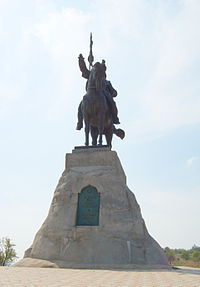You can help expand this article with text translated from the corresponding article in Chuvash. (January 2023) Click [show] for important translation instructions.
|
You can help expand this article with text translated from the corresponding article in Russian. (January 2019) Click [show] for important translation instructions.
|
Bulgarism is an ideology aimed at the "revival of Bulgars' national identity" and Volga Bulgaria statehood.[2] It originated in the second half of 19th century within the Wäisi movement[3] and the Society for the study of the native land (Chuvashia).[4] It was revived at the end of the 20th century as "neobulgarism" in Tatarstan, Bashkortoston and Chuvashia.

The ideology is based on the theory that Volga Tatars, Bashkirs and Chuvash descend from Volga Bulgars. The theory was supported by the Soviet authorities in mid-20th century as an alternative to the "reactionary" theory claiming the Golden Horde descent.[5][6][7][8]
In the 21st century, the ideas of Bulgarism have been revived through the activities of Neo-Bulgarists.
See also
editReferences
edit- ^ "Памятник булгарскому эмиру Ибрагиму I бен Мухаммаду"
- ^ Татарская энциклопедия, Kazan, 2002, vol. 1, p. 490.
- ^ Усманова Д. М. Мусульманское «сектантство» в Российской империи: «Ваисовский Божий полк староверов-мусульман». 1862—1916 гг., Kazan. 2009, p. 3.
- ^ Денисов П. В., "Этнокультурные параллели дунайских болгар и чувашей", Чебоксары: Чуваш. кн. изд-во, 1969, p. 10
- ^ Schnirelmann, p. 24
- ^ Azade-Ayse Rorlich, "The Volga Tatars: A Profile in National Resilience", 1986, ISBN 0817983929, Chapter 1: "The Origins of Volga Tatars", p. 6
- ^ Victor Schnirelmann, "Who gets the past?: competition for ancestors among non-Russian intellectuals in Russia", Woodrow Wilson Center Press, 1996, ISBN 0-8018-5221-8, ISBN 978-0-8018-5221-3, Chapter 4: "The Rivalry for the Bulgar Legacy"
- ^ D. M. Dunlop (1967). The History of the Jewish khazars. New Jersey. p. 34.
{{cite book}}: CS1 maint: location missing publisher (link)